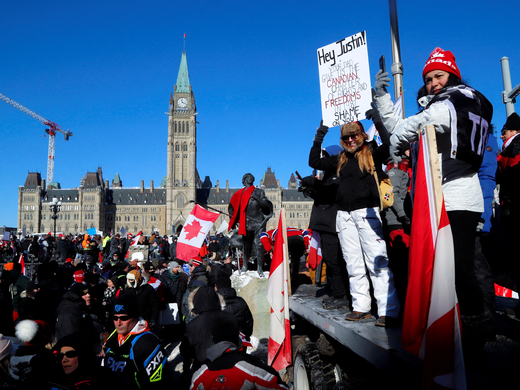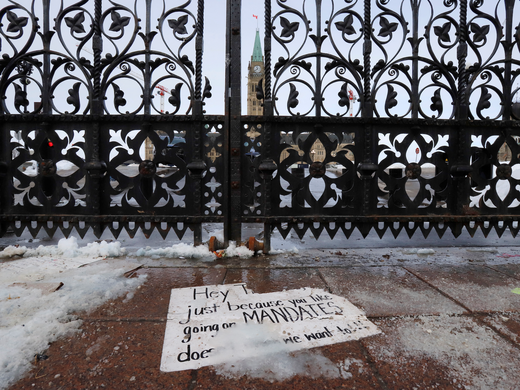Doxing is the practice of publishing someone’s private personal information without their consent. In the digital era, it is the internet’s pre-eminent ad hominem attack. Of all the precedents being normalized in recent years that degrade public discourse and discourage participation in politics, recourse to doxing is, perhaps, the most disquieting one. As a tactic of intimidation, it sets the stage for the worst kinds of vigilantism and violence.
During the so-called “freedom convoy” of truckers protesting COVID-19 restrictions and mask and vaccine mandates, which travelled to and occupied Ottawa, Canada, early in 2022, the use of this tactic became all too common.
The most egregious attempts to dox during the convoy came from the protesters themselves. In late January, as the convoy made its way to Ottawa, the sergeant-at-arms of the House of Commons warned members of Parliament about being doxed, following online solicitations by convoy protesters for their personal information.
Days later, an Access to Information Act request sought the names and badge numbers of Royal Canadian Mounted Police officers who participated in the enforcement actions at the Ambassador Bridge in Windsor. Truck companies were reluctant to cooperate with law enforcement for fear of being doxed by other truckers. And, according to intelligence reports, a former member of Prime Minister Justin Trudeau’s security detail who disagreed with the federal government’s vaccine mandates may have even leaked the prime minister’s private schedule some months before the protest.
In addition to these disturbing activities, there was little hesitation on the part of those opposed to the convoy to publish and disseminate the private personal information of the truckers and their sympathizers. Efforts such as the @ottawaconvoyreport on Instagram and crowd-sourced mapping sites made doxing a community effort.
Various media outlets joined the ride, using the hacked personal information of donors to the GiveSendGo fundraising site to identify individuals and draw inferences about their donations. In September, CBC even felt it worthwhile to compare that hacked data to donations to the Conservative Party’s leadership race — without any explanation as to why it was newsworthy or in the public interest to do so.
Each of these instances reckoned with the reality that doxing can be, at times, justified in the public interest. There are instances where it is vital for the public to know otherwise private information. But in our divided and polarized environment, presuming when the non-consensual disclosure of private personal information is in the public interest and when it is not (including when it is deserving of liability and punishment) is the problem.
We do not even try to talk to each other anymore — a point well made by Kevin Vickers, the former sergeant-at-arms of the House of Commons. As security expert Stephanie Carvin also recently highlighted, we live in a splintered mediasphere with self-contained information ecosystems. These ecosystems’ competing views of the public interest dictate when it is appropriate to dox.
Overwhelming public support once made such difficult decisions easier for us. But we have come far from the days of October 1970, when the federal government invoked the War Measures Act with the support, according to a Gallup poll, of 87 percent of Canadians, including 86 percent of francophones.
By contrast, days before the Emergencies Act was invoked, an Ipsos poll found 46 percent of Canadians said they “may not agree with everything the people who have taken part in the truck protests in Ottawa have said, but their frustration is legitimate and worthy of our sympathy.” Among 18-34-year olds, the rate was 61 percent.
Since then, polls have oscillated. In May, an Angus Reid poll showed that support for the invocation of the Emergencies Act had dipped to just 46 percent. Following compelling recent testimony from Prime Minister Trudeau, it bounced back up.
It should not be forgotten that in the lead-up to the invocation of the Emergencies Act, two provinces explicitly requested the act not be invoked shortly before the federal government went ahead and did so. Five provinces requested it not be invoked in their jurisdictions. It was anyway.
The Canadian Security Intelligence Service (CSIS), Canada’s primary national intelligence agency, specifically advised the federal government that it did not believe a threat as defined under the relevant legislation existed. No law enforcement agency called for the invocation of the Emergencies Act. This was the central requirement for invoking the Act, as professors Leah West and David Schneiderman helpfully reminded us.
But these are mere details. Whether or not invoking the Emergencies Act was justified is for most a question of politics, not precedent. When the latter does not matter — when the ends justify the means — people will tolerate or condemn an instrument’s use based on who uses it, just as people are ready to tolerate or condemn doxing based on whom it targets.
Such double standards now characterize the public discourse today. As the convoy showed us, we can be more than happy to give a pass to doxing committed by our side, often while criticizing our opponents for doing the exact same thing. Unscrupulous procedures and practices are often only to be condemned when they are deployed by one’s opponents. Yet more than ever, respect for the type of precedent needed to stabilize our institutions and strengthen the rule of law means honouring the rules for those with whom we disagree most.
This is something far too many of us are unwilling to do.
This article was cross-posted in The Globe and Mail.



